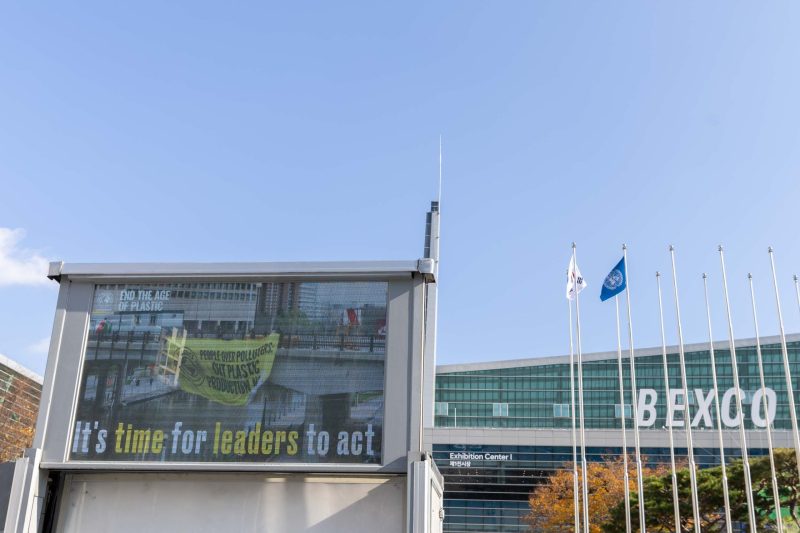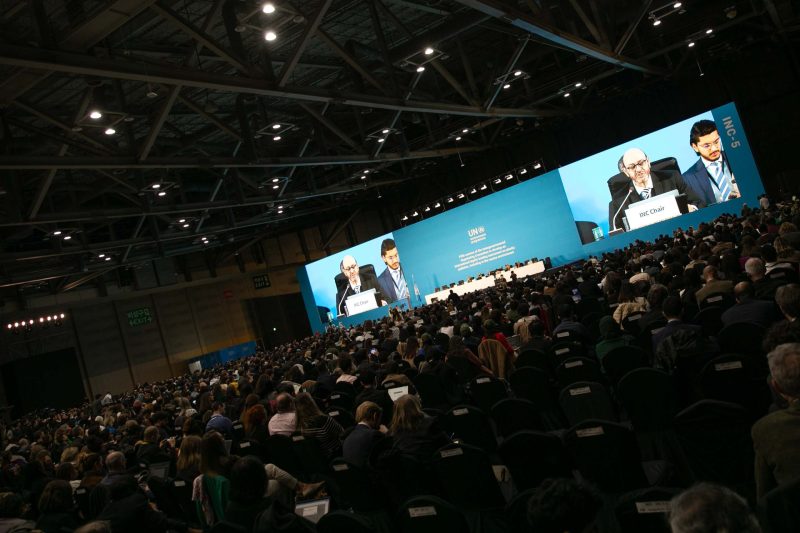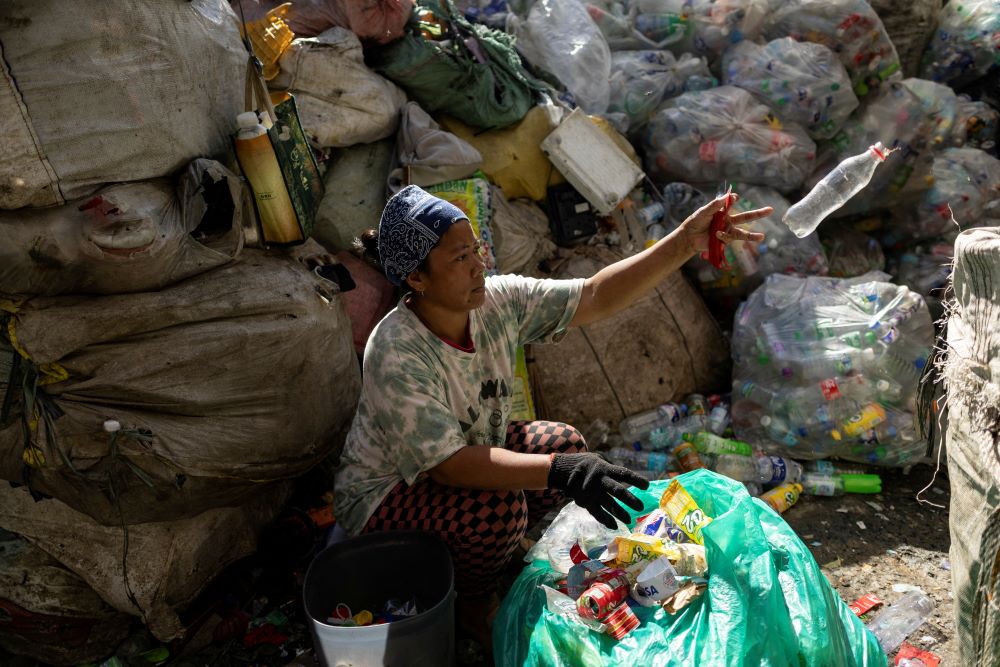The Busan talks which ended in the early hours of Monday were meant to be the final step in agreeing a UN treaty to end plastic pollution. But rumours started swirling on Sunday afternoon – later confirmed – that they wouldn’t be the last.
Fighting back the exhaustion from one too many sleepless nights, diplomats and observers wondered why the talks had broken down – and what could prevent the same happening again when countries reconvene next year to try and push a pact over the finish line?
One clear, prevailing narrative was borrowed straight from UN climate change negotiations: a vocal minority of defiant, well-coordinated petrostates had killed off the majority’s efforts to clinch an ambitious agreement to end plastic pollution.
More than 100 countries – from rich Western states to African, Latin American and Pacific nations – got behind a drive to include provisions to cap plastic manufacturing in the new UN accord, rather than limiting it to a narrower focus on recycling.
Anything short of that would be a failure and a betrayal, they repeated in unison throughout the week-long deliberations. “The time for the freedom to pollute is over,” said European Union envoy Tony Agotha on Friday. “Mopping the floor when the tap is open is useless.”
“Economic interests”
Only around 9% of plastic is recycled worldwide, according to the Organisation for Economic Co-operation and Development. It wrote in an October report that only through “stringent policies to curb production and demand”, combined with better waste management, could the world “nearly end plastic leakage to the environment by 2040”.
Nearly all plastic is made using plant-heating fossil fuels and, as production is projected to double or triple in the next 25 years, that spells trouble for efforts to limit global warming and stem the flood of plastic waste clogging up the Earth’s oceans and littering its land.
But a group of self-defined “Like-Minded” countries led by Saudi Arabia, Russia and Iran – which also includes most Arab states and quietly counts on support from India – don’t want to close the door on a key economic sector. In Busan, they pushed back strongly against any attempt to include provisions to cap plastic manufacturing in a legally binding UN pact.
They reiterated their view that production curbs fall outside the scope of the treaty, saying they could cause “economic disruption”, trade restrictions and shortages of essential materials.
In response, Ghana’s lead negotiator Sam Adu-Kumi told reporters on Sunday it seems that “people are looking at their economic interests without looking at the common enemy” of plastic pollution and “its devastating effects”.
Fossil fuel-producing nations and companies see the petrochemicals industry, including plastics, as a lifeline because demand for oil and gas in the energy sector is projected to decline as the world shifts to cleaner sources for power and transport.
China, the United States, India, South Korea and Saudi Arabia were the top five primary polymer-producing nations in 2023, according to data provided by Eunomia.
More time needed
The deep divisions between countries were on full display during a marathon seven hour-long closing plenary stretching into the early hours of Monday morning in South Korea.
Juliet Kabera from Rwanda, speaking on behalf of the High-Ambition Coalition (HAC) of countries, brought the house down when she asked everyone who supported her statement – condemning calls from a minority of countries to remove “indispensable” binding provisions from the text – to “stand for ambition”.
Russia’s delegate spoke of “production regulation models” being imposed “purely for economic reasons”, while Kuwait’s negotiator – on behalf of the Like-Minded group – expressed “concern” over a “rush to showcase progress” in negotiations where “everyone is bringing its lenses”.
On Sunday, after the final session was suspended without an agreement, Inger Andersen, executive director of the UN Environment Programme (UNEP), which is running the talks, said more time is needed to overcome “persisting divergence in critical areas”.
“We cannot afford to miss” the opportunity to make tackling plastic pollution a reality at the next session, she added in a written statement.
But, given the enduring stalemate, many weren’t sure how that would be possible as they exited the cavernous plenary room.
Higher level political involvement
Siddharth Singh, programme manager at the Delhi-based Centre for Science and Environment (CSE), told Climate Home the next round of talks would be “tough as the US would be negotiating under the Trump administration, possibly strengthening the low-ambition countries”.
The date for the resumption of the INC-5 talks has yet to be set, with the Earth Negotiations Bulletin reporting some countries want the next session to be convened in the first half of 2025 so as not to lose the momentum built in Busan, and others calling for it to be held in July or August next year given much work is still required before agreement can be reached.
Some negotiators and observers are hoping China can play a decisive role in bridging the divide with the petrostates. Its Vice Minister Guo Fang told the closing plenary that all countries should “propose more pragmatic and balanced solutions” that address the “entire life cycle” of plastics, while taking into account their national differences.
Aleksandar Rankovic, co-founder of the Common Initiative, a campaign group, called for “a much stronger involvement from heads of states or ministers” – something that was glaringly missing in Busan.

As negotiations continued behind closed doors, signs outside the UN plastic talks venue in Busan called for leaders to act and produce a strong treaty to address plastic pollution, November 29, 2024.
(Photo: IISD/ENB – Kiara Worth)
Vote or consensus?
Meanwhile, a growing chorus of voices believes the only viable option to ensure that a new global pact contains stringent provisions on plastic production is to put the issue to a vote, rather than relying on the current consensus-based system for approving decisions.
David Azoulay, director of environmental health at the Center for International Environmental Law (CIEL), said ambitious countries should combat “the weaponisation of consensus by a small number of countries”.
“We must resist the idea that this process is destined to remain paralysed by obstruction,” he added, calling on governments to resolve the issue “once and for all” at the next negotiating session.
Eirik Lindebjerg, global plastics policy lead at WWF, said a small number of countries are “holding the negotiations hostage” – and those pushing for a strong agreement “must be ready to vote or adopt a treaty-of-the-willing”.
Production curbs needed for strong global pact on plastic pollution, campaigners say
Invoking a vote is technically an option according to the rules that govern the negotiations.
But at the second session of talks on the treaty in June 2023 in Paris, countries struck what Senegal’s national delegate Cheikh Ndiaye Sylla described on Sunday as a “gentleman’s agreement” to rule out voting throughout the process, adding it had been a “big mistake”.
Backtracking on it now is likely to spark a strong response from the “Like-Minded” group – and some other developing countries – which strongly believe all decisions should be made by consensus.

Delegates gather for the closing plenary of the INC-5 talks in Busan, South Korea on December 1, 2024. Photo: IISD/ENB – Kiara Worth)
While several Latin American, African and Pacific island members of the High-Ambition Coalition have publicly supported the need to consider voting, rich nations by and large remain nervous about that option.
According to CIEL’s Azoulay, they fear it would create “bad blood”, upsetting powerful players like India and China, and running the risk of denting multilateralism in an already tense geopolitical situation.
In a statement following the end of the meeting in Busan, the INC’s chair, Ecuadorian diplomat Luis Vayas Valdivieso, said the mandate of the talks had “always been ambitious”, adding “ambition takes time to land”.
Governments agreed that a “Chair’s Text” compiled by Valdivieso and issued on Sunday will serve as the starting point for negotiations at the resumed INC session in 2025.
“We have many of the elements that we need, and Busan has put us firmly on a pathway to success,” he said. “I call on all delegations to continue making paths, building bridges, and engaging in dialogue.”
(Reporting by Matteo Civillini; editing by Megan Rowling)
